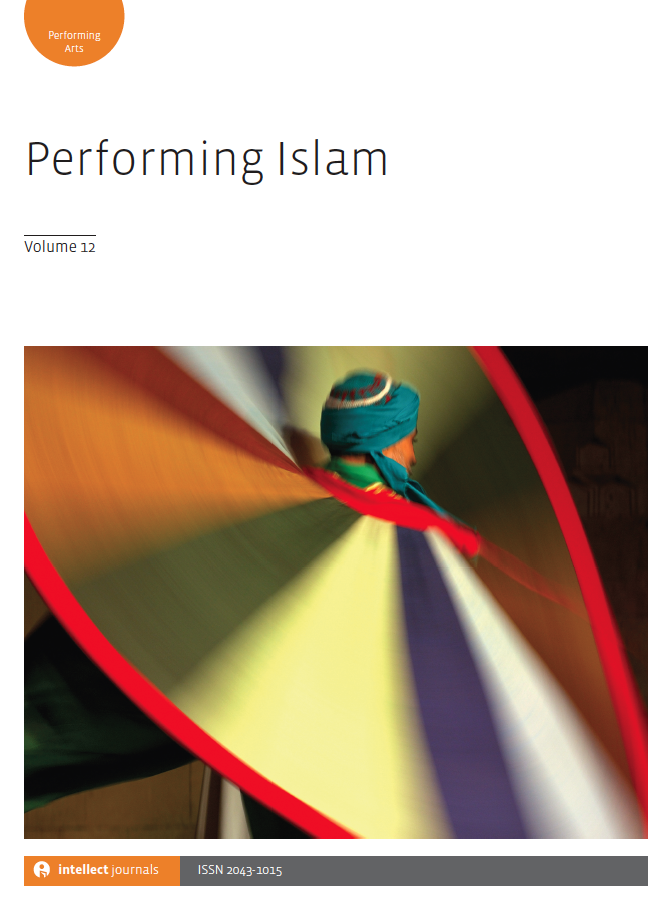- Home
- A-Z Publications
- Performing Islam
- Previous Issues
- Volume 2, Issue 2, 2013
Performing Islam - Volume 2, Issue 2, 2013
Volume 2, Issue 2, 2013
-
-
The drums of Islam, a shrine and a story set in Pakistan
More LessAbstractMany kinds of act we recognize as performative and help constitute religious experiences all over the world. This article focuses on the experiences of drummers, dancers and other participants at a Sufi shrine in Lahore, Pakistan. The readers of this journal are likely to have encountered historical debates concerning the appropriateness of music in Islam, as well as discussions regarding what qualifies as recitation, as music, or as noise. Understanding these debates and semantic concerns is an essential part of gaining insight into important aspects of Sufi Islamic religious experiences. In this article I invite the reader to contemplate performance not only in reference to music and dance themselves but also with respect to the creative non-fictional form in which I present them ethnographically. This article is adapted from my forthcoming book, The Voice in the Drum: Music, language, and emotion in Islamicate South Asia (2014), a hybrid piece of creative and analytic writing in the form of a novel. It is based on my fieldwork in India and Pakistan over a 28-month period in late 1996 and on shorter visits extending into the mid- and late 2000s.
-
-
-
Islamic concept of music communication in street begging performance: A study of Babiyala in Ilorin Metropolis
More LessAbstractThis study examines the Islamic perspective of musical renditions by babiyala/for the sake of God itinerant musicians as a communicative tool in street-begging performance in Ilorin Metropolis. In this respect, we use, primarily, the observation, descriptive and interview methods for the study. Relevant secondary sources such as journals, books, newspapers and the Internet are used to complement the primary sources. Findings from this study therefore prove that music has been a veritable communication medium adopted by the babiyala itinerant musicians as a measure to be noticed by their benefactors, who in turn give alms to them. Islam, the dominant religion in Ilorin metropolis, plays a major role in appreciating their performance through alms giving to meet their daily needs. The law made by the state government illegalizing the activities of itinerant musicians both skilled and unskilled who source for alms publicly from members of the public is not a practical solution to these vices. It also proves that, despite this law, the rate of street begging is on the increase. We therefore conclude that the state, through the National Directorate of Employment Labour and Productivity, should create a scheme aimed at empowering abled babiyala itinerate musicians who form part of the majority of them in Ilorin metropolis. This can be achieved by developing them in the area of musical skills that will enable them to be self-reliant. This, when implemented, will markedly reduce their numbers and give them a place in the social stratification.
-
-
-
Hausa film: Compatible or incompatible with Islam?
More LessAbstractGlobalization, now at its peak, is tied with media like a computer to its screen. Film is a vital media technology endowed with ample efficacy through which much propaganda – for good or bad – is sold out to the people. This is so because almost everybody can understand the language of film and its appeal; it is conferred with the communicative power that often mobilizes people to react peacefully or otherwise. Such as it is, film-makers in Kano as well as other didactic, Shari’ah-abiding and substantially Muslim northern states of Nigeria are in constant ideological clash with the larger society, the government and the religious institutions. The film-makers are accused of misrepresenting and attacking the sociocultural and the religious value systems. The major ethnic group in the state and the region is Hausa, the people who are strict followers of Islam, the religion, which, in a greater proportion, conforms with their Arab-influenced culture; thus, both the culture and Islam frown at the films, especially such as those being produced, for many contain Indian masala popular cinema and quasi-Euro-American and non-Islamic ideas, practices and experiences, and do not correspond to the culture and the religion of the people. Therefore, this article, among other things, seeks to look inwards in search of what led to the current state of affairs. The writer offers advice on how to better things.
-
-
-
French Republican secularism and Islam in North African diasporic cultural production
More LessAbstractCenturies of anti-Arab stigma continue to haunt Franco-Maghrebians, the descendants of ex-colonial French North African migrants born and brought up in France. Franco-Maghrebians’ anti-colonial civic resistances (riots) against decades of segregation are dismissed as evidence of their alleged Islamicization and communitarianism. Focussing on Azouz Begag’s novel Béni ou le paradis privé (1989), this article explores how Franco-Maghrebians’ investment in and reproduction of the Republican secular world-view in fact leads to the denigration, suppression and corporeal annihilation of their Arabo-Muslim heritages. Drawing upon the theories of Jacques Derrida (1996) and Mikhail Bakhtin (1981), western philosophical obsession with origins, centres and margins returns diasporic citizens to colonial dualistic binaries, trapping them in the mirrors of negation and affirmation. Such a predicament is contrasted with the presentation of alternative philosophical perspectives of the other in Ismaël Ferroukhi’s film Le grand voyage (2004). Making references to Seyyed Hossein Nasr (2002), Ali Shariati (1979) and Karen Armstrong (2012), this research examines how Islamic ethical imperatives captured in motion across lands, cultures and time envision coexistence, contesting much of the existing discourse surrounding French Muslims and Islam.
-
Most Read This Month


